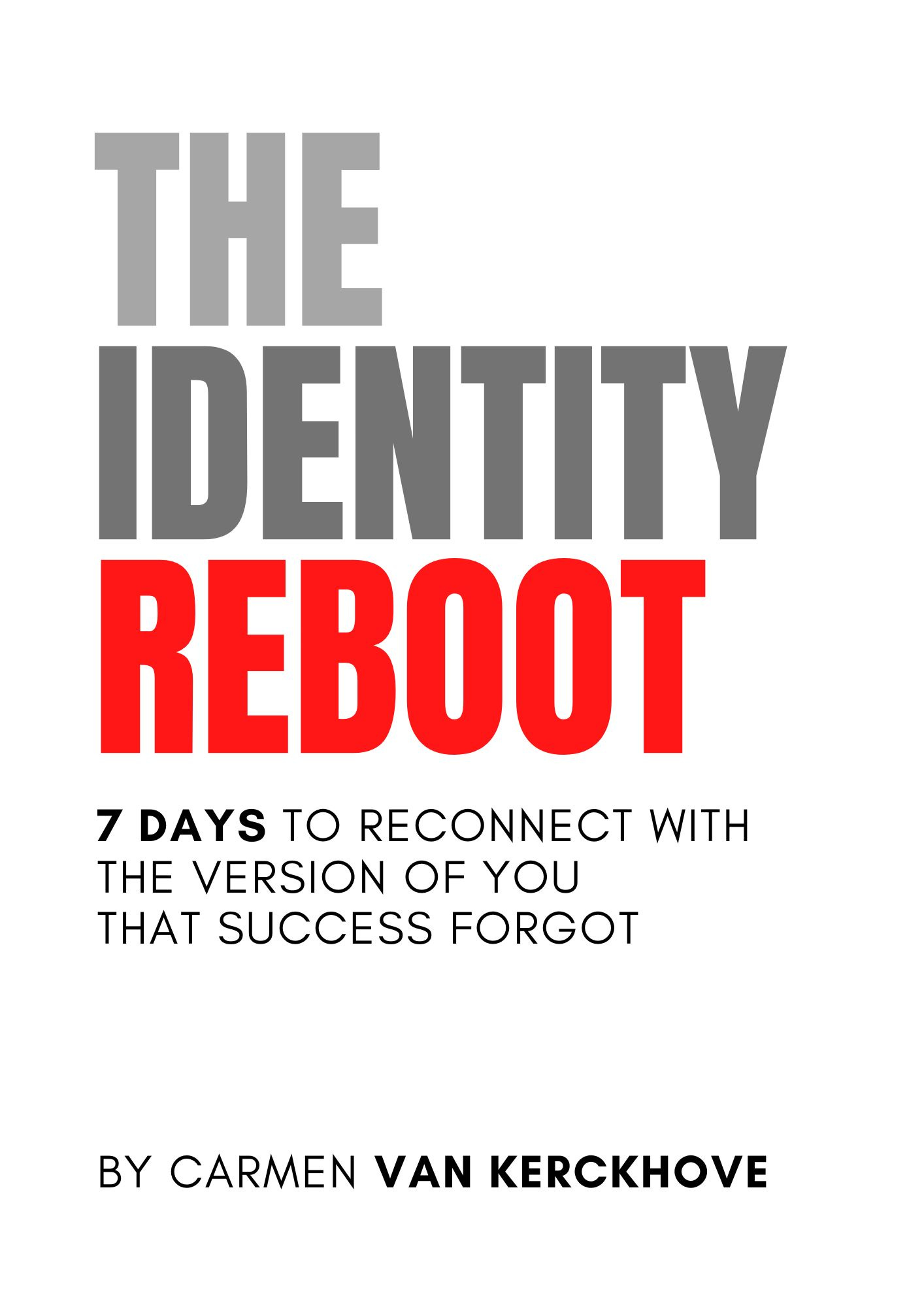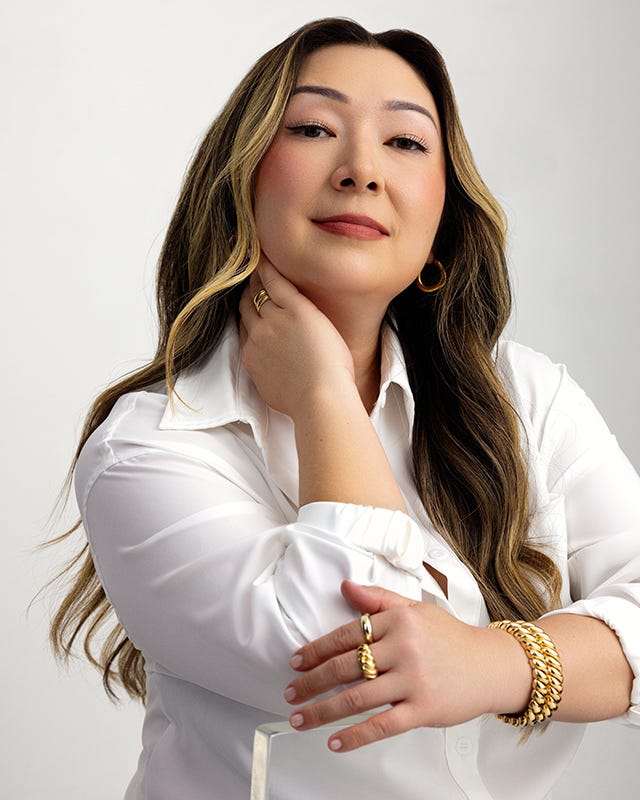You are not your job. And soon, you won't have one.
The identity collapse hiding inside the job market crisis
Shawn K has a computer science degree, 21 years of experience, and a resume that once opened every door.
Today, he lives in a small RV trailer and drives for DoorDash.
After nearly 800 job applications and a year of unemployment, he’s still hearing nothing back—from roles that pay half his former salary, and ones he’s wildly overqualified for.
You might be tempted to stop reading here. Maybe you think this is a story about software engineers. Or the tech industry. Or a niche disruption that doesn’t apply to you.
It’s not.
This is a story about all knowledge workers. Everyone whose job depends on reading, writing, planning, synthesizing, managing, creating, or communicating. The people we’ve historically called “white-collar.” The ones who were told that their degrees, careers, and salaries made them safe.
Shawn isn’t a fluke. He’s a forecast.
And he didn’t get here by making “bad choices.” He didn’t major in something obscure or impractical. He wasn’t flaky or unfocused. He did everything the conventional wisdom told us to do: Get a practical degree. Go into tech. Build a solid resume. Buy property. Do the responsible thing.
It wasn’t that long ago that “Teach your kids to code” was considered foolproof advice. Now ChatGPT can spit out functional code in seconds—and that bulletproof path is looking more like a punchline.
Because the jobs AI is coming for first aren’t the ones most people assumed. They’re not manual labor or frontline retail. They’re not cashiers or delivery drivers.
They’re the people with resumes like yours.
And if you’ve built your identity around being useful, impressive, or indispensable at work?
What’s coming next is going to hurt.
The cracks are already showing
Something is cracking beneath the surface. You can feel it, even if you can't quite name it.
It's there in the wave of tech layoffs that never quite stopped. It's there in the quiet concern of friends who got promoted but still don't feel secure. It's there in headlines about historically low labor force participation rates, inflation that refuses to fully retreat, and a housing market no one can afford.
But it's not just economic weirdness. It's a foundational shift in how work functions—and more importantly, what it means.
I keep thinking about Nicole Leffer's recent LinkedIn post where she made a simple observation: "We will all work less in the future, whether we choose to or not." She advises marketing leaders—and she’s paying close attention to how AI is already reshaping not just their work, but the entire landscape of modern careers.
Her advice? Get a second source of income, invest what you earn, and—perhaps most importantly—start building an identity separate from your work.
Because that's the core of what's coming: not just job loss, but identity collapse.
"I did everything right" is no longer a safety net
We've been sold a comforting story about work and identity: Get the right degree. Pick the right field. Build the right career. Follow these steps, and you'll be secure—not just financially, but in knowing exactly who you are and where you fit in the world.
That story has been fraying for years. Now it's about to unravel completely.
Derek Thompson writes in The Atlantic about a troubling sign: the unemployment rate for recent college graduates has "deteriorated noticeably" in the past few months, now at an unusually high 5.8 percent. Even newly minted M.B.A.s from elite programs are struggling to find work.
More alarming is what Thompson calls the "recent-grad gap"—the difference between unemployment rates for young college graduates versus the overall workforce. This gap has hit an all-time low. Young college graduates are entering an economy that's relatively worse for them than any month on record going back at least four decades.
Why? As Harvard economist David Deming told Thompson, "When you think from first principles about what generative AI can do, and what jobs it can replace, it's the kind of things that young college grads have done" in white-collar firms. "They read and synthesize information and data. They produce reports and presentations."
When I look at what's happening with generative AI and automation, I don't just see technological advancement. I see millions of people about to lose not just jobs, but the entire scaffolding of how they understand themselves.
Because the truth is, work isn't just about paychecks. For most of us, it's about belonging. Status. Purpose. The answer we give when someone asks, "So, what do you do?"
And we're frighteningly ill-equipped for what happens when that answer disappears.
Collapse happens faster than anyone predicts
Twenty years ago, I was working in magazine publishing. Jobs were competitive. Mastheads were hierarchies that made sense. The business model had functioned essentially the same way for decades—and the money was flowing. These magazines weren’t just cultural powerhouses; they were practically printing cash.
Then digital happened.
The collapse wasn't gradual. It was sudden and absolute. There was no slow fade. The industry buckled in what felt like a blink. Entire magazines folded overnight. Flagship brands gutted their mastheads. Editorial teams were reduced to a fraction of their former size. Senior editors with 20+ years of experience found themselves competing for freelance gigs against recent graduates willing to write for exposure.
Even the survivors weren’t spared. Vogue—once the crown jewel of print media—is now better known for its YouTube videos than its magazine. The future arrived, and the format didn’t make it.
The prestige vanished. The structure vanished. The economy vanished.
And crucially, no one saw it coming until it was already over.
This isn't just about magazines. Look at what streaming did to Hollywood. For decades, being a working writer in TV was considered one of the most stable, well-paid creative careers possible. Writers' rooms were institutions. The path was clear. Then within five years, streaming platforms completely transformed how shows get made, how many episodes they run, how writers get paid.
Now we’re seeing the same quiet collapse happen in industries that once seemed untouchable. In his Substack Blood in the Machine, journalist Brian Merchant writes: “The AI jobs crisis is here, now.” Not ten years from now. Not in some imagined sci-fi dystopia. Right now.
He points to Duolingo, where an “AI-first” strategy has already replaced up to 100 human lesson creators—despite the tech not actually being ready yet to write lessons on its own. And Duolingo isn’t the exception. It’s the prototype.
The industries we think of as “safe” today won’t be tomorrow. And the shift won’t come gradually—it will arrive faster than most people are willing to believe.
By the time they accept it’s real, it will already be over.
You still have a job. But for how long?
Maybe you're reading this thinking, "I'm secure in my field. This doesn't apply to me."
I get it. It's a natural reaction. But you don't have to lose your job to lose your identity. What happens when your role still exists, but means something entirely different than it did before?
What happens when the prestige hierarchy we've all internalized suddenly flips?
For decades, we've operated under an unspoken understanding of career status: white-collar jobs at the top, blue-collar work below. Professional services above manual labor. Knowledge work over physical skills.
That hierarchy is about to be dramatically reshuffled. The jobs most vulnerable to AI displacement aren't manufacturing or service roles—they're the supposedly "prestigious" knowledge work positions. The lawyers, the managers, the analysts, the marketers.
Meanwhile, jobs that require physical presence, manual dexterity, and human-to-human interaction—plumbers, electricians, nurses, aestheticians, physical therapists—those roles become more secure, more valuable, more respected.
Yes, some of these may eventually be vulnerable to robotics. But robotics is advancing far more slowly than generative AI—and even when it catches up, there will always be jobs we’d rather a human do.
This is already shaping educational choices. Nicole Leffer advises parents of college-age children to "get them seriously thinking about going into a trade instead of college." Even as someone who has always valued higher education, she recognizes that "the people of the next generation best positioned to thrive will be those with trades who do something in the real world with their hands."
Are you ready for that flip? Is your sense of worth ready?
Because whether you keep your job title or not, what that title means to you and to society is about to undergo a seismic shift. And if your identity is too tightly wound around that old meaning, the psychological whiplash will be severe.
The real assignment: Separate your identity from your job
So what can you do?
I wish I could offer a five-step plan to AI-proof your career. I wish I could tell you which fields will remain safe, which skills will always be valuable, which paths will guarantee security. But anyone claiming to have that answer is selling false comfort.
The truth is messier, harder, and ultimately more liberating: the most urgent skill you need to develop right now isn't technical. It's existential.
You need to learn how to unhook your worth from your work.
This isn't about abandoning ambition or giving up on finding meaning through your career. It's about building a core identity that can survive—even thrive—when the external validation of titles, salaries, and professional recognition becomes unstable.
Most people can't do this. They've spent decades defining themselves through their work, their industry, their place in a status hierarchy that suddenly won't exist. The coming years will be especially brutal for them.
But for those who learn now how to separate who they are from what they do for money? This transition, while still challenging, offers a chance for profound liberation.
How to unhook your worth from your resume
Here are a few places to begin:
Question your status hierarchies
What assumptions about "good jobs" versus "bad jobs" have you internalized? Where did those beliefs come from? Challenge your own biases about professional prestige. Ask yourself honestly: if your current role lost its social status but kept its pay, would you still want it?
Identify peak experiences outside work
When have you felt most alive, most yourself, most in flow—completely separate from your professional achievements? These moments hold clues to your identity beyond your job title.
Invest in relationships that have nothing to do with your career
Not networking contacts or industry friends, but connections based on shared values, interests, or simple enjoyment of each other's company.
Develop skills for their own sake, not their marketability
Learn something purely because it fascinates you or brings you joy, with no thought to how it might advance your career.
Practice introducing yourself without mentioning your job
This simple exercise can be surprisingly revealing—and uncomfortable. If you can't easily describe yourself without referencing your professional role, that's valuable information.
The goal isn't to care less about your work. It's to build an identity robust enough to withstand major shifts in how that work is valued—by others and by yourself.
Letting go of the title—and finding the truth underneath
The biggest identity collapse I ever experienced didn’t come from a layoff or a failed business.
It wasn’t even my first time letting go of a prestigious career path. Years earlier, I’d walked away from the Ivy League-to-Goldman Sachs pipeline and taken an office manager job that gave me space to breathe and create. But this pivot was different.
It came when I walked away from a media platform I’d spent years building—one that gave me prestige, visibility, and cultural relevance.
I became a regular commentator on NPR, CNN, and MSNBC. I was quoted in The New York Times and The Washington Post. Literary agents were reaching out with book deals. I spoke at college campuses nationwide, commanding five-figure speaking fees from Fortune 500 companies and major nonprofits. My inbox was always full. My name carried weight. I was at the center of important conversations—and I had worked hard to earn that seat.
And then, I gave it all up.
I stepped out of the spotlight and into two roles that carried zero cultural cachet: full-time mom and neighborhood martial arts school manager. Suddenly, I wasn’t the one getting introduced on stage. I was reduced to “Sean’s mom.” “Sensei’s wife.” The woman behind the desk, folding uniforms and restocking Gatorade.
And I struggled with that more than I wanted to admit.
I hadn’t realized how much of my identity was built on being seen. Respected. Admired. There was no applause in toddler nap schedules. No “thought leadership” in haggling with parents over tuition payments. Just silence. And for a while, that silence felt like erasure.
But over time, that silence started to feel like space—space to hear myself think, to ask harder questions about why I’d needed so badly to be visible in the first place. Space to notice that the things that made me powerful—discernment, clarity, the ability to see through bullshit—weren’t tied to a byline or a microphone. They were mine. And they’d always been mine.
What I rebuilt in the years that followed didn’t always come with the same prestige. But it came with something I hadn’t expected: peace. The kind of peace that comes when your worth isn’t on lease from your resume. The kind that doesn’t disappear the minute a title does.
That’s the invitation here—not to live in fear of what’s coming, but to prepare in a way that might actually set you free. Because what looks like a career unraveling might actually be your return to self.
Jobs come and go. Industries rise and fall. Prestige hierarchies flip overnight. But who you are—separate from what you do for money—is the one thing no economic shift can take away.
So let me leave you with one question. It’s the same one I had to answer when I stepped away from everything I’d built:
If your job disappeared tomorrow, would you still know who you are?
That’s the question to start living into now.
What role, title, or identity have you had to let go of? Was it by choice—or forced on you? And what did you learn about yourself in the process? Share your stories in the comments 👇
A special thank you gift from me to you:
There’s no paywall on any of my writing. Paid subscribers aren’t paying for access—they’re investing in work that resonates.
As a thank-you, you’ll receive a special gift:
The Identity Reboot:
7 Days to Reconnect with the Version of You That Success Forgot
If your sense of self has gotten tangled up in roles, titles, accomplishments—or the pressure to stay impressive—this guide is for you.
This is your reset.
It’s a 7-day PDF experience designed to strip away everything you’ve outgrown, so you can reconnect with what’s real, true, and still yours.
Inside, you’ll:
Uncover who you are beyond the resume, the job title, or the public performance
Identify which parts of your identity feel authentic—and which feel like armor
Rebuild a vision of yourself that isn’t based on productivity, approval, or prestige
This isn’t about starting from scratch. It’s about remembering who you were before the world told you who to be.
If you’ve ever seen yourself in my writing, this is your next step:
And if now’s not the right time?
I’m still glad you’re here.
Bring Carmen to your next event
Carmen Van Kerckhove is a writer and speaker whose work explores how technology intersects with social class and cultural change, reshaping the way we live and work. Her essays challenge conventional wisdom about success, ambition, and identity, offering a provocative lens on what comes next for a generation caught between collapsing systems and emerging possibilities.
Based in New York City, Carmen speaks at keynotes, conferences, leadership summits, and company retreats.
→ For speaking inquiries, contact info@topflightfamilymedia.com. Carmen’s speaker one-sheet is available for download here.







I just wanted to say THANK YOU to everyone who’s read, shared, and responded to this piece. The outpouring of thoughtful, generous, deeply real comments has honestly meant the world! I’ve been a little quiet here only because I’ve felt overwhelmed (in the best possible way!) trying to take it all in.
There’s so much richness in this conversation, and what I keep coming back to is this: we’re not just talking about jobs. We’re talking about identity, worth, grief, reinvention. And the fact that so many of you were willing to name your own experiences inside that mess is SO powerful.
Thank you for meeting this piece with such depth. I’m so grateful that you’re here and I hope that you’ll stick around for more important discussions about the future of work, status and self-worth, and how we build meaning when the old systems stop making sense.
A few years ago, I sat in my living room feeling utterly miserable, leveraged to the max, leveled by dread, and realized: This is the exact life I had wished for. It just doesn’t feel the way I thought it would feel. Where’s the confidence? The fulfillment?
That’s when my unraveling began.
Turns out? Fulfillment will never come from the outside. No title, no accolades, no paycheck, no prestige, will ever do it. The path to redefining myself was loooong but I’m infinitely better for it.
I hope everyone who needs to read this reads it!
What a loving, beautiful insight to share 🤍